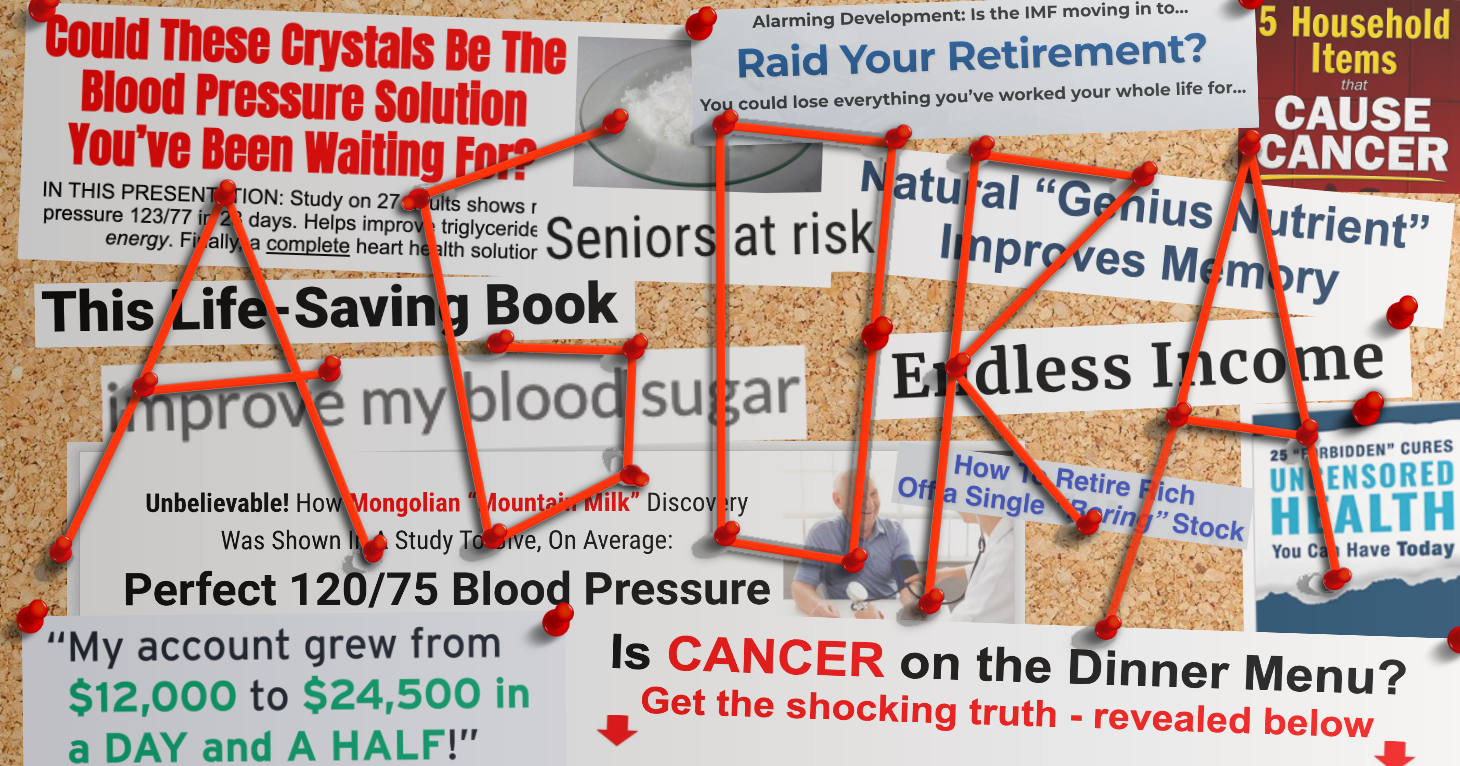
What You Should Know about USANA
Supplement MLM takes down dozens of deceptive claims following TINA.org investigation.
TINA.org refers publishing giant to FTC for enforcement action.
|
UPDATE 11/2/21: The FTC says it is providing full refunds totaling more than $2 million to consumers who purchased certain health and finance-related publications sold by Agora Financial and other defendants. Our original story follows.
Few parent companies weave a corporate web as complex as Baltimore-based publishing giant Agora, also known as The Agora, Agora Inc. and, most recently, Monument & Cathedral Holdings (M&C). Known primarily for its vast array of books, pamphlets and newsletters hawking health and financial advice to seniors and retirees, Agora’s multilegged marketing machine is comprised of more than 80 different entities selling more than 400 different products, programs and services including nutritional supplements and publication subscriptions.
This February, five of those M&C affiliated entities, Agora Financial, NewMarket Health, NewMarket Publishing, Health Sense Media and Health Sense Publishing, along with its affiliates Dr. Richard Gerhauser and Zachary Scheidt, agreed to pay more than $2 million to settle FTC charges that they tricked seniors into purchasing publications using deceptive health and income representations. In addition to the monetary settlement, which amounted to only 0.4 percent of Agora’s annual revenue, the settlement order includes a key provision: It bars not just the named defendants but also M&C and “each of its subsidiaries, successors and assigns” from making unsubstantiated health claims and misleading financial representations.
That’s important because, four months later, not only are the named defendants violating the settlement order (and have been ever since it was entered), but a TINA.org investigation has found that several additional companies in Agora’s vast ecosystem are as well. Among the companies that were not named in the FTC’s October 2019 lawsuit but are bound by the settlement order is Stansberry Research, which a previous TINA.org investigation found used deceptive testimonials to sell its investment newsletters. In total, TINA.org has catalogued more than 300 videos, transcripts, web posts, order pages and print materials marketed by numerous companies under the Agora umbrella that use deceptive marketing to trick seniors into purchasing products and programs. Moreover, the investigation found that the companies employ a multitude of dark patterns to amplify their deceptive tactics and take advantage of their consumer base.
Based on the overwhelming number of order violations and manipulative dark patterns in use, TINA.org has filed a complaint with the FTC urging it to reopen its Agora investigation and take appropriate enforcement action to prevent the country’s elderly population from getting further scammed.
Deceptive Health Claims
Agora and its related entities advertise their products to millions of older consumers seeking preventions and cures for debilitating diseases. For example, in one of 45 video presentations in TINA.org’s sampling, Health Sense Media and Dr. Gerhauser, both named defendants in the FTC’s lawsuit, claim a book called “The Secrets of Underground Medicine” contains “77 exclusive and groundbreaking reports” for fighting cancer, diabetes, Alzheimer’s, heart disease and other conditions that disproportionately affect older adults.
TINA.org purchased a subscription to Natural Health Today (a Health Sense Media publication) to obtain the allegedly “free” book and found that it does not contain any secret disease treatments or preventions that are supported by competent and reliable scientific evidence.
Another named defendant, NewMarket Health, falsely asserts that more than 140 supplements can prevent or treat diseases, often through the use of testimonials. Take, for example, Advanced Glucose Support – while the product description says that it is meant to “support healthy blood sugar, blood pressure and cholesterol levels,” testimonials on the page go a step further and claim that the supplement can improve and lower blood pressure, blood sugar and cholesterol numbers.
And despite the FTC specifically calling out unsubstantiated type 2 diabetes claims in its complaint, multiple videos published by Agora entities still promote remedies for “better” or “healthier” blood sugar, reduced insulin resistance with “zero” changes to diet and exercise habits, and lowered fasting blood sugar.
One of the more outrageous videos in TINA.org’s sampling is from the Institute of Natural Healing (an OmniVista Health publication, which, in turn, is an M&C company) and is titled “One big vaccine fact you need to know.” The video markets, among other things, COVID-19 treatments and preventions. Specifically, the video promotes a “free” book called the Coronavirus Vaccine Survival Guide, which is “in limited supply” and contains information about “safe, alternative solutions [to the coronavirus vaccine] you simply will not hear about from Big Pharma or mainstream medicine” and “breakthrough treatments you won’t hear about in the headline news like the ‘A-V Virus Shield to prevent viruses from entering the body, or the 3-Step ‘Wash-away’ technique to fight them once they’re there.”
Of course, the “FREE BOOK” is not actually free – TINA.org had to purchase a $74 subscription to Independent Healing to obtain the book. And while the guide does suggest that taking zinc and performing nasal irrigation can help prevent COVID-19, it later admits that neither treatment is scientifically substantiated or proven.
TINA.org also received a number of print marketing materials in the mail during the course of its investigation that make deceptive disease-treatment claims, including:
Deceptive Financial Claims
And TINA.org’s investigation reveals that the deception does not stop with illegal disease-treatment claims. Agora entities exploit those looking to secure their financial well-being and make unrealistic guarantees of putting seniors “on the path to an independent, wealthy retirement in no time” and fatten their “retirement nest egg,” without clearly disclosing many of the risks associated with the investment strategies. In reality, the publications and programs that Agora offers, some of which cost as much as $5,000, are primarily lining Agora’s pockets.
TINA.org has collected more than 30 marketing videos and corresponding transcripts that make deceptive financial claims to promote more than 20 different financial publications. These videos violate the order by, among other things, making financial representations without clearly and conspicuously disclosing “all material risks, bases, costs, restrictions, limitations, conditions and prerequisites applicable to the Financial Claim,” as is required. For example, some make claims of obtaining financial freedom:
Others guarantee large investment returns:
Dark Patterns Used by Agora
TINA.org’s investigation also highlighted another area of interest for the FTC not explored in its original investigation of Agora – the continual use of dark patterns to augment Agora’s deceptive marketing impact.
Dark patterns are website design features used to confuse and manipulate consumers into making decisions that they would not otherwise make. Research suggests that dark patterns have proliferated in recent years as companies seek to maximize profits. Agora uses a number of dark patterns to convince seniors to forgo their physician-recommended medications and therapies in lieu of their unproven products and revelations, and to pay for deceptively marketed financial subscriptions:
1. Devil in Disguise – hiding ads. The ads that Agora embeds in free articles across its network of websites don’t always look or sound like typical ads. In many cases, they mimic the conspiratorial tone of the post. Take the article titled “Beware of This DEADLY Sleep Habit!” authored by Dr. Gerhauser. Just as the title of the article promises to reveal some type of hidden secret, an embedded ad asks, “How often do you eat eggs? Did you know it does THIS to senior brains?” Because of the messaging and positioning in the article, consumers may not immediately recognize the ad, which then affects how they interact with it. Consumers intrigued by the teaser click on the box and are led to a Health Sense Media video presentation narrated by Dr. Gerhauser about “millennial medicine,” which deceptively promotes the Natural Health Response subscription.
2. FOMO – creating a false sense of urgency. Clicking on Agora ads usually pulls up a webpage that contains a video presentation, which consumers are unable to rewind or fast forward. These webpages and videos generally use a series of time pressure tactics designed to hasten a purchasing decision. Agora tactics include telling consumers, over and over again, that the video is going to disappear or that the advertised product is in limited supply or only available for a limited time. Agora also routinely puts consumers on the clock to make purchases, further ramping up the pressure to act fast.
The time limitations, however, are fabricated, as evidenced by the fact that the featured dates continuously change so that the marketing can be used in perpetuity, as the below screenshots illustrate.
3. Confirmshaming – shaming consumers into making purchases. Once Agora has a consumer in its maw, it starts with the add-ons. But instead of giving consumers the option to just say no to additional purchases, Agora forces them to click phrases like “No thanks, I’m not interested in this vital information” or “No, I want to Forfeit My Chance to Upgrade.” This type of dark pattern is called confirmshaming and it is designed to guilt consumers into compliance.
4. Hotel California — making it impossible to leave. When consumers attempt to X out of Agora video presentations, confirmshaming-type pop-up warnings typically appear:

“Wait! By clicking out of this page you’ll forfeit the chance to learn about this exciting and exclusive opportunity.” Consumers are encouraged to finish watching the video or read the transcript instead. Those who make a purchase, as TINA.org did, are then inundated with hundreds of emails not only from publications they subscribed to but unsolicited emails from many other publications. TINA.org continued getting emails even after canceling subscriptions making it impossible to escape the company’s tentacles.
5. Hiding the Ball – burying fees in fine print. Most of Agora’s order pages contain automatic renewals, a fact that is frequently only disclosed in the fine print of order pages, and in some cases, under fields requesting credit card information, a potential violation of the Restore Online Shoppers’ Confidence Act.
One simple goal
Focusing on older consumers is a winning strategy for companies like Agora, who are not concerned about violating federal court orders or truth-in-advertising laws.
Scammers target seniors presumably because this demographic is more likely to lose a greater amount of money to fraud than younger consumers. In fact, those 80 years of age and older typically lose more money as a result of fraudulent schemes than any other age group – the median loss being a whopping $1,600. TINA.org’s investigation shows that Agora and its multitude of related entities are more than willing to say almost anything to ensure that seniors buy their products.
TINA.org has provided the FTC with more than enough evidence to nail Agora to the wall. It’s now up to the agency to do the right thing and stop Agora’s deceptive marketing practices once and for all. As former FTC Acting Chair Rebecca Kelly Slaughter recently stated, “If we’re not following up on our orders, then why have them in the first place.”
Read more about TINA.org’s complaint to the FTC here.
Supplement MLM takes down dozens of deceptive claims following TINA.org investigation.
MADISON, CONN. June 21, 2021 – Despite a $2 million settlement with the Federal Trade Commission in February 2021, publishing giant Monument & Cathedral Holdings, better known as Agora, and…
Comparing the amount companies agree to pay to settle deceptive marketing charges with their annual revenue.

